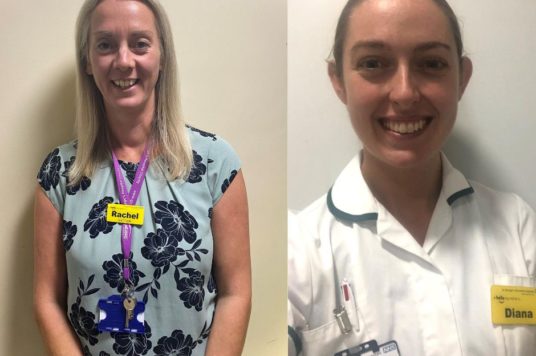Celebrating our Allied Health Professionals… meet Diana and Rachel
Allied Health Professionals make up an essential part of our workforce at St George’s Hospital and play a key role in many patients’ journeys.
On Allied Health Professionals Day (Saturday 14 October 2023) we celebrate the skilled workforce, whose roles are as follows:
- Art therapists
- Dramatherapists
- Music therapists
- Podiatrists
- Dietitians
- Occupational therapists
- Operating department practitioners
- Orthoptists
- Osteopaths
- Paramedics
- Physiotherapists
- Prosthetists and orthotists
- Radiographers
- Speech and language therapists
The hospital group is hosting an award ceremony for our outstanding group of Allied Health Professionals, and we also caught up with Diana and Kate to find out a bit more about their roles and how they help children with cancer at St George’s Hospital.
Diana Doherty – Paediatric Occupational Therapist
How long have you worked at St George’s Hospital? Three years
Tell me about your team and what you do to help children with cancer?
Our Paediatric Occupational Therapy team within St. George’s initially started out with just one Occupational Therapist and has since grown into what it is today. The team currently consists of three qualified Occupational Therapists (B8, B7, B6 -rotational) and one Multi-Therapy Technician (B4 – part-time with OT), with the hope of expanding further in the near future.
Occupational Therapists play a fundamental role in the rehabilitation and care of oncology patients. We work alongside children with cancer to enable them to enhance their independence in activities of daily living. Through the provision of equipment, adaptations, and aids, Occupational Therapists can help children with cancer regain skills and achieve maximum functional performance.
Following a life-altering diagnosis of cancer, Occupational Therapists play an essential role in the provision of useful and practical education and advice on sleep and fatigue management strategies and techniques. These practical tips can be crucial for children with cancer to help maintain their independence throughout their treatment.
As specialists in the assessment of cognition, Occupational Therapists are central in supporting children with cancer to maintain their engagement levels in their daily activities. This can be done by targeting specific cognitive deficits such as memory, attention or executive functioning and providing both children and their parents with useful strategies and play exercises to promote and enhance their cognitive functioning.
The St. George’s Paediatric Occupational Therapy team is excited by the prospect of developing their oncology service further with the view of establishing a holistic and patient-centered approach to the assessment and care of children with cancer across the hospital.
What do you enjoy most about working within our children’s cancer team?
The enjoyment gained from working alongside children with cancer and being part of their rehabilitation journey provides us, as Occupational Therapists, with great joy. Within St. George’s, the Children’s Cancer team has been exemplary in showcasing the Trust’s values across the board. Through their open MDT working and holistic view toward the treatment and care of oncology patients, the values of kindness and respect have undoubtedly been demonstrated.
Rachel Barrett – Advanced Paediatric Oncology Dietician
How long have you worked at St George’s Hospital? 15 years. Prior to this, I completed a PhD and then worked for 3 years at The Royal Children’s Hospital in Melbourne.
Tell me about your team and what you do to help children with cancer?
Studies show that a child who is well nourished is able to cope better with treatment, have reduced complications, and is more able to fight infection (Gibson et al, 2010.) As a dietitian, I work with families to help make sure patients receive good nutrition throughout their cancer treatment. I see patients around the time of diagnosis to assess their baseline nutritional status and discuss the potential impact of treatment on their nutrition. Due to the cancer itself or due to the side effects of treatment, my patients often find it difficult to meet their nutritional requirements and need additional support. I provide evidence-based individualised dietary advice to help optimise their intake. Many of my patients need additional support. I, therefore, assess the need for and manage the provision of, individualised dietary advice, Oral Nutritional Supplements, Nasogastric Tube feeding, and Parenteral Nutrition. To provide a high standard of care I work closely with the patients and their families, the oncology team, ward staff, pharmacists, psychologists and other members of the multidisciplinary team.
What do you enjoy most about working within our children’s cancer team?
I find my job extremely rewarding. It is a privilege to get to know patients and their families and to contribute towards their care at St George’s. At a time when so much is beyond a family’s control, it is often grounding for them to be able to discuss their child’s nutrition, especially when it can contribute so much to a feeling of normality and improve quality of life. I enjoy working with a wide range of professionals who have fantastic knowledge, expertise, and experience in working with paediatric oncology patients and who genuinely care about each patient and their families.



